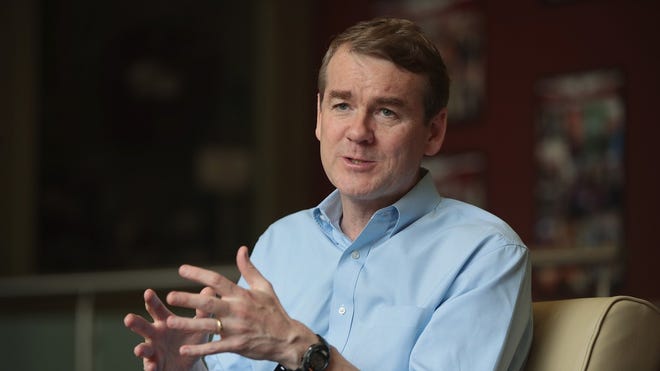Democrats fight in Congress for more federal funding to plug abandoned oil and gas wells and reform leasing policy took the form this week of legislation introduced by U.S. Sen. Michael Bennet of Colorado that New Mexico environmentalists argued was needed to ensure wells are cleaned up by the energy companies that drill for fossil fuels.
While U.S. Sen. Ben Ray Lujan (D-NM) introduced the Revive Economic Growth and Reclaim Orphaned Wells (REGROW) Act earlier this year to unlock federal funding for well plugging across the U.S., his party member U.S. Rep. Teresa Leger Fernandez of New Mexico later introduced a bill that would fund the work but also raise bonding rates energy companies pay when wells are approved.
Funds from the bonding payments are used to pay for plugging wells and remediating the land should a company abandon the well.
More:Plugging oil and gas wells could create thousands of jobs, billion in wages for New Mexico
But New Mexico leaders and activists argued bonding requirements were inadequate to fully fund the work, meaning taxpayers would be forced to make up the difference.
A study published in May by the Center for Applied Research and commissioned by the New Mexico State Land Office found an $8.1 billion funding gap between dollars needed to remediate the 60,000 wells on New Mexico State Trust and private land the money the state has.
While New Mexico has about $201 million for the work, the study estimated it would cost about $8.34 billion to shut in the wells and restore the land to its original state.
More:New Mexico advocates call on EPA for stricter oil and gas emission limits
The Oil and Gas Bonding Reform and Orphaned Well Remediation Act would aim to increase the amounts companies pay for well bonding, attempting to close the gaps in New Mexico and other oil-producing states.
If passed, the bill would raise bonding requirements to minimums of $150,000 for all of an operator’s wells on an individual lease and $500,000 for an operators wells in an entire state.
Those rates were congruent to Leger Fernandez’s bill in House, which in May passed the House Natural Resources Committee on a 22-17 vote.
More:New Mexico groups debate impact as federal judge blocks Biden’s pause on oil and gas leases
Bennet’s bill would also earmark up to $1.5 billion for well remediation in 2021 and 2022, and then $625 million each following year until 2030.
He also introduced the Public Engagement Opportunity on Public Land Exploration (PEOPLE) Act to require federal agencies notify local landowners, governments and other groups of federal land management decisions and publish the actions online, including a 90-day notice of lease sales and 30-day notice of drilling permit and other subsequent approvals.

“Our bills not only invest in orphaned well clean up, but also restore the role of local leaders in lease sales, and hold companies operating on public lands to the same high standards that responsible operators already follow,” Bennet said.
“Together, these bills will reduce methane emissions — which is the fastest way to protect our climate, restore wildlife habitat, and create good-paying jobs.”
More:Houston-based oil and gas wastewater company expands operations, addressing seismic concerns
Robert McEntyre with the New Mexico Oil and Gas Association, a trade group representing oil and gas companies in New Mexico, said that while the industry supported more federal funds for well remediation, bonding requirements should be decided by the states based on their individual needs.
He said New Mexico updated its bonding rates in 2018, and any new changes could pre-empt the effects.
“We support sound and environmentally responsible efforts to assist states in their programs to plug and remediated orphaned wells. Bipartisan legislation, like the REGROW Act, would help advance sound and environmentally responsible practices to address these sites across the country,” McEntyre said.
“Bonding requirements, like those New Mexico updated in 2018, are best left to states to determine to meet their unique and individual needs.”
More:The wind cries money: Renewable energy struggles to compete with oil and gas in Carlsbad
But Jesse Deubel with the New Mexico Wildlife Federal argued said increased rates were needed to mitigate a major environmental threat Deubel said was posed by extraction in the state.
“For far too long, wildlife habitat and communities across the state of New Mexico and the West have been forced to deal with the threats posed by orphaned oil and gas wells, including the impact of pollution on our health and wildlife habitat,” Deubel said.
“Senator Bennet’s important bills will bring long-awaited reforms to the broken oil and gas leasing system and ensure our public lands work for all communities.”
More:Outlawed: Oil and gas spills now illegal in New Mexico. Industry supports rule change
James Jimenez, executive director of advocacy group New Mexico Voices for Children said its funding increases for well plugging would take the burden off the state which could use more of its revenue for public education and healthcare.
“Defunct oil and gas producers have littered New Mexico with orphaned wells while taxpayers are forced to foot the bill to clean them up,” he said. “Those critical funds could be spent supporting our children and schools instead of cleaning up the mess oil and gas companies have left behind.”
Adrian Hedden can be reached at 575-618-7631, achedden@currentargus.com or @AdrianHedden on Twitter.






